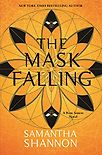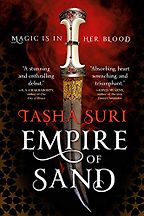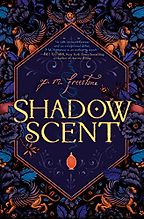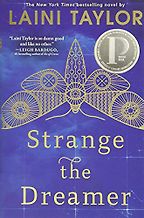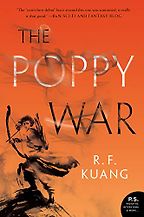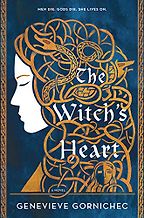Thank you for putting together a reading list of the best mythopoeic fantasy books. Could you talk a little about what mythopoeia means to you, and how you’ve used it in your work?
Mythmaking is something I do, or try to do, in my books as part of creating a convincing paracosm. When I’m worldbuilding, I think a great deal about how to layer my world so it feels convincing, ancient, lived-in. By ‘layer’ I mean that I don’t just build a world for this one story—I think about who was in this world before these characters, who else is there now (and how they came to be there, and how they intersect), and who might come after. And one of the themes of my standalone novel The Priory of the Orange Tree is how myths and legends can be misinterpreted and manipulated.
By paracosm, sorry, you are referring to a complex imaginary world?
That’s it, yes. Sorry, I learned that word so long ago it’s rooted itself into my casual speech! It comes from Greek, para (beside, alongside) and kósmos (universe), referring to a detailed secondary world, and was coined in the 1970s. It was originally used in relation to worlds imagined by children, specifically, but I use it more broadly to describe fantastical realms, especially ones that are built and broadened over a long period.
What is it like to live alongside an alternate fictional reality?
I’ve imagined other worlds beside ours for so long, I’ve genuinely forgotten what it’s like to live only in this one—I’m realities layered on realities. Each time I write, I feel like I’m peeling one layer away to tread on another.
‘Mythopoeia’ as a term was dreamt up by J R R Tolkien, I believe, and I think quite a few of our readers will be aware of the vastness of Tolkien’s mythological world. Were you a Tolkien fan? Would you describe his work as an influence?
I can’t get to the bottom of whether the word was invented by Tolkien, but he certainly used it. The Lord of the Rings is an example of artificial mythmaking on a grand scale.
I have a complicated relationship with Tolkien. In a roundabout way, he was the reason I stopped reading fantasy for a while when I was young. I saw the adaptation of The Fellowship of the Ring in 2001, when I was about ten. The ‘Flight to the Ford’ scene—where Arwen flees from, and then faces, the Nazgûl—was one of the first examples I’d ever seen of a woman taking an active role in fantasy, and it left an immediate and deep impression. As soon as the credits rolled, I hauled my dad to the nearest bookshop to buy the book, assuming Arwen would have an even larger role—the book is always better, right?—only to discover that she doesn’t take Frodo to Rivendell in the book. The role was filled by a male Elf called Glorfindel. I was so young at the time that it broke my heart a little—I gave up on fantasy for a while, thinking I would never see a woman at the helm, until I discovered Sabriel by Garth Nix.
Get the weekly Five Books newsletter
That wasn’t Tolkien’s fault, of course—or, indeed, Peter Jackson’s—but Tolkien does represent an era where fantasy was considered far more a male domain. I actually use the all-male Fellowship of the Ring as a sort of litmus test for how far feminism has come in media. Personally, I still can’t imagine a world where the entire Fellowship could have been made up of women and no one would say it was ‘pandering’ or ‘politically correct’ or that the creator had an agenda.
As a creator, I admire Tolkien’s enormous worldbuilding, particularly his use of languages—etymology is one of my passions. I envy his skill in constructing languages of his own, which is something I haven’t yet attempted. The Guardian sent me to review an exhibition in Oxford called Tolkien: Maker of Middle-earth a couple of years ago, and it was remarkable (and a little intimidating) to see the Tree of Tongues—a sketch he did to show the development of languages descending from Valarin.
The first book you’ve chosen to recommend is Tasha Suri’s Empire of Sand, the first in her Books of Ambha series. What is it about, and why do you admire it so much?
Empire of Sand is the first part of an adult fantasy duology set in a world inspired by Mughal India. The first book follows Mehr, the illegitimate daughter of an imperial governor, whose mother was Amrithi—part of a nomadic minority descended from the daiva. When a cruel mystic comes to court, Mehr is pressured into an arranged marriage with a warrior named Amun, which blossoms into a beautiful slow-burn romance.
I love so many things about this book, but the magic system, particularly, is unlike anything I’ve encountered before—it’s based on dance. I also appreciate that Suri celebrates the endurance and cleverness of women, and the quieter sorts of strength that women have historically used to survive and claim some power under patriarchy:
She did not have her jewels or her fine clothes, but she had this power, at least: she could give him a simulacrum of what he desired from her. And hold her crumbling strength tight. Let him think he had broken her. As long as he believed he already had, as long as she fooled him, he would not succeed in truly doing so.
I feel the genre dismissed these qualities for a long time, when we were still fixated on ‘Strong Female Characters’ that embodied traditionally masculine traits.
I chose Empire of Sand as a mythopoeic fantasy because the backstory has a rich, mythological feel to it—the world is shaped by the dreams of slumbering gods, whom Mehr can influence through dance and hand sigils. Sometimes you’ll get a rare storm of dreamfire, where the dreams have a visible impact on the world. I’m very excited for Tasha’s next book, The Jasmine Throne.
Your latest book The Mask Falling is the fourth in a sequence of seven. Series are a common feature in the fantasy genre, I think especially so with these richly imagined mythopoeias. What’s the appeal of writing a series, and how far ahead do you plan the events of The Bone Season?
Being able to write a series this long is an enormous privilege. Paige, the main character, and I have grown up together—although I’ve overtaken her age-wise by a long way now. She and I were both 19 when I started writing the series, and now I’m 29. But getting to stay with her for such a long time, put her through so many different situations, and explore how she reacts and changes in response to those situations, is so rewarding. It also means I can build a dystopia far larger than a trilogy would allow, and examine in from both inside and out.
I’ve always had the skeleton of the series laid out in my mind, but I’ve been working on it for a decade already, so some of my ideas have changed over time. I leave myself room to manoeuvre. I know where I’m going, but not always exactly how I’ll get there.
Next you want to recommend Shadowscent by P. M. Freestone. Published in 2019, the follow up Crown of Smoke is already out.
Shadowscent is a duology set in an empire where scent defines everything—perfume is worth more than gold, prayers must be sent up with incense, and smell is queen of the five senses. Scent Keepers, revered by the people, serve as mediators between the gods and mortal rulers: ‘There’s as many myths and stories about Scent Keepers as there are feathers in their dresses.’ As with the other books I’ve chosen, this is a book where the gods feel very close, and myth intersects with reality. In terms of plot, The Darkest Bloom is a classic quest fantasy—the main characters have to collect various ingredients for an antidote to save the prince, who has been poisoned. It reads, to me, like it could be a tale from a long-fallen empire.
“Tolkien does represent an era where fantasy was considered far more a male domain”
P. M. Freestone has such a fine eye—and nose—for detail, and describes scent so evocatively throughout the series. They inspired me to think about it more in my own work. I actually went with them to a perfumer called 4160 Tuesdays in London to help design a perfume based on the black dakhai, the titular ‘darkest bloom’ and the most valuable flower in the world of Shadowscent. It was fascinating to learn more about the notes and ingredients that make up one perfume, how much each element costs, and so on.
Tell me about our third mythopoeic fantasy book recommendation. This is Strange the Dreamer by Laini Taylor. It’s from a best-selling new duology about a lost city.
It’s not all that new—Muse of Nightmares, the sequel, came out in 2018. But I think it’s Laini Taylor’s most recent published work, yes. She’s a writer I’ve always admired for her exquisite prose—I learn new words every time I read one of her books.
Strange the Dreamer is a masterwork. It begins with Lazlo Strange, an orphan raised by monks, who is enthralled by tales of the lost city of Weep. It seems like a myth until a delegation arrives from Weep, led by Eril-Fane, the Godslayer, who needs help to liberate his city from an enormous structure called the Citadel, which is anchored above the city—a fixed reminder of the tyrannical Mesarthim, the god-like race who once occupied it and terrorised the people of the city below. In Strange, Taylor deconstructs her myth as she creates it—Weep is a story to Lazlo, but is, in fact, a real place, where people live in the literal shadow of their trauma.
Why do you like it so much?
Laini is very good at approaching serious, complex issues and examining them with compassion and nuance. Eril-Fane, in particular, is a triumph of a character, one of my absolute favourite men in fiction—a haunted figure who tries to be kind, who did terrible things to save his people, who still lives with the guilt of his actions and the burden of his trauma. He’s a villain to some and a hero to others, but between those two identities, he is wonderfully, agonisingly human.
Strange the Dreamer is a tragedy, but it’s also full of wit and aches with tenderness, and the worldbuilding is masterful. Weep feels like a real place, even before you see it for the first time.
Next up we have R. F. Kuang’s The Poppy War, which is fantasy inspired by Chinese history. Why do you like it?
People have been recommending The Poppy War to me for years, and I finally picked it up last year. I’m so glad I did—it is a triumph. While it is strongly rooted in real-world history, it feels mythic not only because of its take on magic, where certain people have the shamanic power to channel the gods, but because it feels like you’re witnessing the birth of a character who will pass into legend. The protagonist, Fang Runin—or Rin—is a war orphan who comes from nothing (or thinks she does). When her adopted family threatens to marry her off to further their drug smuggling, she studies until she qualifies for Sinegard, the most prestigious military school in Nikan—an empire living on the knife-edge of peace, while the Mugen Federation lurks just beyond the sea, waiting to invade.
Five Books interviews are expensive to produce. If you're enjoying this interview, please support us by donating a small amount.
I’m a big fan of this book for many reasons, one of which is that Kuang is forthright about the violence and cost of war. While the book is a fantasy, she draws straight from the pages of history, confronting the Nanjing Massacre and Unit 731, among other horrors that should be more widely known. I also appreciate the fact that Rin actively seeks power, which she fosters throughout the book. In my experience, female characters are often judged more harshly for qualities like ambition and anger, so the fact that a chaotic, powerful god is acting through a young woman still feels revolutionary, even in an age where fantasy has far more room for women.
Does fantasy often take inspiration from past historical events?
Yes—there’s a time-honoured relationship between fantasy and history, to the point that we often see fantasy being called ‘historically inaccurate’ without a hint of irony. Using history as a cornerstone can make for strong world, or serve as a mirror for real-world truths, as in The Poppy War—I personally loved weaving details from the past into the The Priory of the Orange Tree—but unfortunately, history can also be used to try to strangle representation and progress in the genre. I wrote an essay on this subject to unpack my thoughts in detail, but as an example, you’ll sometimes get people claiming that, say, a queer relationship in a fantasy is ‘historically inaccurate’ and therefore makes the world unbelievable, which is absurd. I saw a man criticising The Witcher for including women who use swords.
There are certain fantasy fans who have a misogynistic, whitewashed, straightwashed view of the past and want every new world to be filtered through that broken lens—forgetting, one: that fantasy isn’t history, and two: even if it were, their idea of history is simply wrong.
And finally, you’d like to recommend a debut novel: The Witch’s Heart by Genevieve Gornichec. What do you admire about it?
The Witch’s Heart is the exact kind of book I’m actively seeking at the moment—books that enrich and broaden women’s stories from both history and mythology. Books that fill in the woman-shaped gaps in our past. Book that give voices to female characters who have been sidelined and silenced in the very tales in which they appear. Incredibly, despite being half the human race, women are thought to only occupy about 0.5% of all recorded history. Addressing this is crucial, and I think authors have a huge role to play in that.
“Certain fantasy fans have a misogynistic, whitewashed, straightwashed view of the past”
Some books I’ve loved in this vein are A Curse of Roses by Diana Pinguicha (about Saint Isabel de Aragão), Burial Rites by Hannah Kent (about Agnes Magnúsdóttir, the last woman to be executed in Iceland), The Curious Tale of the Lady Caraboo by Catherine Johnson (about the titular imposter), Hild by Nicola Griffith (about Saint Hilda of Whitby) and The Mercies by Kiran Millwood Hargrave (about the Vardø witch trials).
In The Witch’s Heart, we get a beautiful and fleshed-out story for the jötunn Angrboða, who is briefly acknowledged as a wife of Loki and mother of his children in Norse mythology. Genevieve Gornichec both acknowledges her erasure and resolves it, giving Angrboða a life beyond her relationship with Loki, even as she explores their love story in detail. We see Angrboða as a powerful witch and seer, a devoted mother, a lover and friend, and most importantly, as a woman at the heart of her own story at last. I’m very grateful for books like this one.
Thank you. To close, might you tell us a little about why fantasy—as a genre, or way of thinking—is so satisfying to you?
That’s a huge question, and the answer will obviously depend on the reader—or the writer—but for me, part of the genre’s lure lies in its possibilities. Fantasy can reflect on the past, mirror the present, muse on what the future could look like, or do away with our world altogether (in as much as that’s possible) and build a new one from scratch. Speculative fiction has no real limit but imagination.
Interview by Cal Flyn, Deputy Editor
April 29, 2021
Five Books aims to keep its book recommendations and interviews up to date. If you are the interviewee and would like to update your choice of books (or even just what you say about them) please email us at [email protected]

